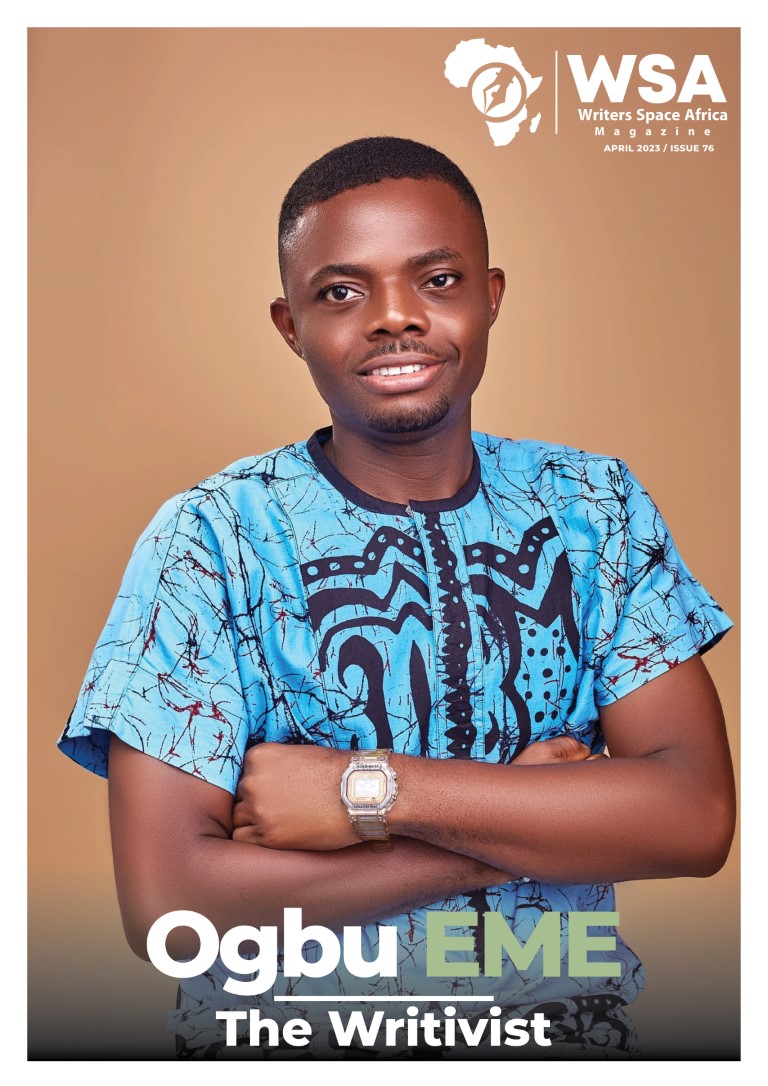Prepare to be inspired by the extraordinary achievements of Ogbu Eme, a gifted author who has captured the hearts of readers worldwide. In 2019, Eme’s outstanding literary talents were recognized when he was awarded the coveted African Writers Awards for Children’s Literature, a well-deserved honour that solidified his place as a rising star in the literary world. Not content to rest on his laurels, Eme continued to push the boundaries of his craft, culminating in yet another impressive accomplishment – winning the Wakini Kuria Prize for Children’s Literature in 2022. If you’re curious to learn more about this talented author’s motivations, plans, and prospects, then get ready for a fascinating journey through the mind of one of today’s most promising writers.
– PPBlessing

PPBlessing: Who is Ogbu?
OE: Ogbu is a children’s author and an English teacher with a mass communication degree from the University of Nigeria, Nsukka. As a children’s author, his stories draw their breath from the communication development theory in which characters and events are models of change. He likes to call himself a writivist.
PPBlessing: Why writivist?
OE:: It’s a quirky coinage from “write” and “activist”. In essence, I want to use my writing to fight for what is right.
PPBlessing: Being an English teacher, do you actively mentor your students towards becoming writivist like you?
OE: Academic writing is a different sort of writing. As a writing instructor, your job is to teach students the skills for writing essays and for succeeding in school and in real life. But I hope to start teaching writing outside the classroom where mentoring on becoming a writivist will be done.
PPBlessing: What’s the connection between mass communication and teaching?
OE: That’s simple. It’s called mass communication, with the mass meaning many and communication meaning exchange of messages. What better way to pass knowledge than teaching in a class room to a mass audience. I could work in the media, but working in the classroom gives me the opportunity to inspire lives.
PPBlessing: How do you inspire lives?
OE: A classroom is a micro-unit of society. The teacher is the president while the pupils are the citizens. When you are a teacher, you are responsible for the lives of those you teach.
PPBlessing: How exactly are you responsible for their lives?
OE: Children are natural imitators, especially young children. They learn by copying. Again, children often wonder what it’s like to be like the characters in the stories they read. So, being responsible for their lives for me means setting examples of leadership, courage and humility, both in person and in print.
PPBlessing: How has this been so far?
OE: So far so good. However, the results may not be explicit now; the future is a reminder of lessons learnt in the past.
PPBlessing: Aside from influencing and shaping the future of children, why else do you write?
OE: I write to be heard: to express feelings and words that I can’t say. I write in the hopes that one day, I will be able to put my village, Alayi, on the map.
PPBlessing: Is it strictly children’s literature that you write?
OE: No. Children’s literature is a genre I discovered after I noticed there weren’t enough African literature for children that talked about current social themes. I have tried my hands on poetry but gave up after a short time practising. Then I tried short stories and that stuck. I actually have published a collection of short stories titled 6 Extremely Easy Ways to Die in Nigeria and Other Stories. Long before all of these, I had completed a full-length manuscript for a prose fiction. It’s lying on the shelf by the way.

PPBlessing: That’s wonderful. Why haven’t you published the manuscript yet?
OE: This was many years ago. I had just finished secondary school, and I didn’t have the knowledge about publishing that I have now.
PPBlessing: Now that you have the knowledge, why haven’t you still published it?
OE: I will have to have a proper look at it’s suitability first.
PPBlessing: How can someone purchase the short stories collection?
OE: It is sold on Okada books and I hope to print it someday.
PPBlessing: Any plans for the printing?
OE: Yes, absolutely! I am working on adding more stories to the collection. I have titles like “There are no Witches in Nigeria”.
PPBlessing: How many stories are you considering and when should we expect it’s publication?
OE: The collection has three stories. I am looking at adding another three. Well, I have to first finish the stories. Maybe, in November this year as I have a children’s picture book I am working on at the moment.
PPBlessing: Godspeed. How do you plan on publishing?
OE: Do you mean the children’s book?
PPBlessing: Yes. Are you using a publishing house or self-publishing?
OE: I have queried a few publishing houses. Fingers crossed. But I am open to self-publishing. The plan is to give traditional publishing a try. I will fully revert to self-publishing this April.
Did you know I self published “Not Too Young to Run”?
PPBlessing: I’m just learning that now.
OE: And I thought I was famous.
PPBlessing: Of course you’re famous… Winning the African Writers Award (AWA) and Wakini Kuria prize is fame.
OE: That’s soothing. Thank you.
PPBlessing: Aside AWA and Wakini Kuria prize, have you won other awards?
OE: No, I haven’t. But I will like to win more. I am looking forward to winning the NLNG $100,000 Prize for Literature in the children’s literature category.
PPBlessing: Fingers crossed. How did you feel when you won these awards?
OE: AWA was my first award, that was in 2019. I grinned from ear to ear when I received the news. It helped to validate my writing as I won in the Children’s literature category. Then Wakini Kuria prize for Children’s literature came after three years (2022). I had gotten better with my craft. The feeling wasn’t as euphoric as the first, but I was elated all the same. You know, winning awards makes your writing recognisable. You go from unknown to known. I should add, it was good to win some money there.
PPBlessing: How have these wins influenced your writing?
OE: Very much. I write better stories. I look at every manuscript that I write as though I was preparing it for a writing competition.
PPBlessing: How long have you been a writivist?
OE: I started writing as early as 11 years. It was merely for the enjoyment of my family. But I got more serious with the craft in 2018.
PPBlessing: Interesting, what made you serious?
OE: I had published an article about localising the Nigerian curriculum on my defunct blog called Drafts Paper. I felt Nigerian authors (African authors by and large) needed to come up with African children’s literature that were socially conscious. And since I could write, I decided to practise what I was preaching. That was when I got serious.
PPBlessing: Now that you’ve mentioned, do you have any online platform where you publish? I couldn’t find the Draft papers and the other website on your profile http://ww1.ogbueme.com/ was also down.
OE: Drafts Paper is defunct. There’s a mistake in the url, its ogbueme.wordpress.com
PPBlessing: Okay. What made Drafts paper defunct?
OE: On Drafts Paper I blogged on a variety of topics. But after I published Not Too Young to Run, I decided to trim it down to publishing. Sometimes, I publish articles on education since I am a teacher.
PPBlessing: What do you do for fun?
OE: I enjoy skating and listening to music. I like hip-hop a lot. Rumba is also one of my favourite.

PPBlessing: Who are you favorite authors
OE: I am a children’s author, so it’s not hard to see why the following are my favourites: Roald Dahl, Nancy Churnin, Dr. Seuss. For adult fiction and non-fiction, I enjoy any story that is well-told, both African and Western.
PPBlessing: What has been most challenging for you as a writivist?
OE:That’s reaching a global audience. That’s been most challenging for me.
PPBlessing: Have you been able to tackle it yet?
OE: I haven’t had solutions yet.
PPBlessing: What’s your ideal day like?
OE: I wake up at 5:10 a.m. Between that time and 6:45 a.m., I prepare for school. I find time to read in the morning when I’m in the bathroom (It works for me.). At 7 a.m. I am in school. School ends at 3:30 p.m., and then I am off to home tutoring. I do some writing while on transit as I have my stories stored on Google Drive. But I write mostly on weekends.
PPBlessing: How do you read in the bathroom?
OE: It’s easy… while I am bombing the bowl.
PPBlessing: Any tip for writers who hope to become award winning like you?
OE: Write stories that haven’t been told before, or that have but yours takes a daring style. Be the big fish in a small pond rather than the small fish in a big pond — I got this wisdom from Malcolm Gladwell.
PPBlessing: This is great advice. What inspires your writing?
OE: It’s the fact that society is yet to become Beulah Land. My writing is driven by the need for a better world.
This Interview was published in the April 2023 Edition of the WSA Magazine. Please click here to download
Read – Gloria Akayi Asoloko – A Double Winner of the African Writers Awards







